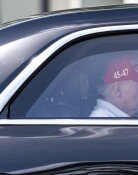Warrant of Arrest Issued to Song Du-yul
Warrant of Arrest Issued to Song Du-yul
Posted October. 21, 2003 22:49,
The Public Peace First Division of the Seoul District Public Prosecutors Office (superintendent public prosecutor: Oh Se-hyen), which is investigating the Korean-German exiled scholar Song Du-yul, 59, on suspicion of a breach of the National Security Law, issued a warrant of arrest October 21 on his suspicion of the anti-national community joining, escaping, and gathering and communication. Park Man, a prosecutor of the Seoul District Public Prosecutors Office said, We issued a warrant of arrest because Song denied his suspicion although it is quite serious and also Song might destroy evidence and flee from the police. He further remarked, We handled it based on a principle (according to the suspicion of his crime).
Songs arrest will be decided at 2 p.m. on October 22 through the courtrooms warrant inspection.
The courtroom issued a warrant this day to Song, who has been summoned to the prosecution for the ninth time, and according to it, Song was detained at the placed designated by the courtroom after the prosecutions investigation.
According to the prosecution, Song is suspected of pro-North Korea activities, such as joining in North Koreas Workers Party in 1973, being nominated as a candidate member of the politics division at the Workers Party in the early 1990s, and spreading the main constituent idea both inside and outside the country.
Especially in connection with Songs attendance at the chief of state and supreme political leader of North Korea, Kim Il-sungs funeral ceremony as a designated funeral ceremony member, the prosecution regards ii that Song did not join in the Workers Party just as formal transit but because he actually worked for the Workers Party as a candidate member.
The present Article 3 of the National Security Law, which deals with anti-national community organization and joining, stipulates that if one is engaged as an executive member or any other leadership position, death penalty, penal servitude for life, or a convict to more than five years is sentenced.
Song talked over with supreme political leader Kim in 1991 and attended the conference on the reunification of North and South Korea. Song also falls under the suspicion of receiving the order from North Korea and contacting with North Korean side from 1973 through March of this year more than 20 times.
However, the prosecution conveyed that they couldnt add Songs crimes - receiving money and other valuables from North Korea under the name of traveling expenses or maneuver money and inviting Oh Gil-nam who was studying in Germany to exile to North Korea in 1985 on his suspicion, because the period of prescription was extinct.
The prosecution said that even though they took a supplementary investigation to Song, Song denied his suspicion excluding his joining in Workers Party and receiving money and other valuables from North Korea, which the period of prescription was extinct.
The prosecution remarked that a warrant of arrest to Song did not certainly mean his indictment, and it hinted Song might not be restricted or charged depending on his conduct.
Meantime, appearing in the prosecution this day Song said, I came to here with feeling of Suinsadaecheonmyong (Do everything that people can and wait for the heavens answer), and added, I will explain properly about other scandals next time.
Headline News
- Yoon removed from office by unanimous court decision
- Constitutional Court mentions responsibility of both Yoon and National Assembly
- Won-dollar rate falls to 1,430 range after impeachment ruling
- Teacher with spinal cord injury transforms into career counselor
- U.S. redeploys Patriot missiles from S. Korea without replacement forces







